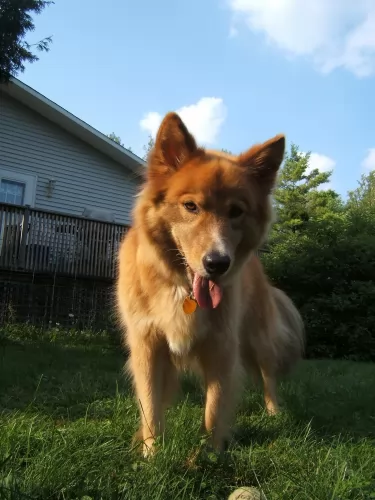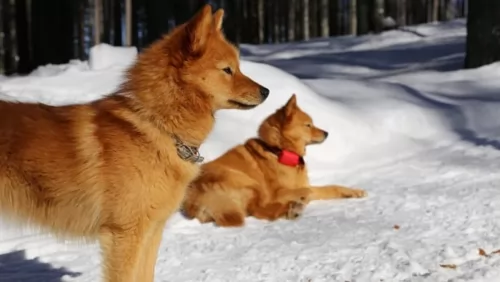 Petzlover
Petzlover Braque Saint-Germain is originated from France but Karelo-Finnish Laika is originated from Russia. Braque Saint-Germain may grow 14 cm / 6 inches higher than Karelo-Finnish Laika. Braque Saint-Germain may weigh 21 kg / 47 pounds more than Karelo-Finnish Laika. Both Braque Saint-Germain and Karelo-Finnish Laika has same life span. Both Braque Saint-Germain and Karelo-Finnish Laika has almost same litter size. Both Braque Saint-Germain and Karelo-Finnish Laika requires Low Maintenance.
Braque Saint-Germain is originated from France but Karelo-Finnish Laika is originated from Russia. Braque Saint-Germain may grow 14 cm / 6 inches higher than Karelo-Finnish Laika. Braque Saint-Germain may weigh 21 kg / 47 pounds more than Karelo-Finnish Laika. Both Braque Saint-Germain and Karelo-Finnish Laika has same life span. Both Braque Saint-Germain and Karelo-Finnish Laika has almost same litter size. Both Braque Saint-Germain and Karelo-Finnish Laika requires Low Maintenance.
 The Braque Saint-Germain, also known as the St. Germain Pointing Dog, is a French creation. The French pointing dogs and the English pointing dogs were mixed to develop the Braque Saint-Germain. He is a versatile hunting dog that was both a pointer and a gun dog. They are medium to large in size and went from being bred by royalty in the 1830’s to a popular everyday hunting dog. The ancestry of the breed can be traced back many additional centuries.
The Braque Saint-Germain, also known as the St. Germain Pointing Dog, is a French creation. The French pointing dogs and the English pointing dogs were mixed to develop the Braque Saint-Germain. He is a versatile hunting dog that was both a pointer and a gun dog. They are medium to large in size and went from being bred by royalty in the 1830’s to a popular everyday hunting dog. The ancestry of the breed can be traced back many additional centuries.
As popular as the Braque Saint-Germain was as a hunter, he gained his notoriety in the show ring. The first time a Braque Saint-Germain entered the ring in 1863 it was an acclaimed breed and upstaged all other pointing breeds. The French Braque Saint-Germain club was opened in 1913 and recognized by the Federation Cynoloqique International (FCI) and in 2006 was recognized by the North American United Kennel Club. Their popularity has risen and fallen since World War II. It has flirted with extinction more than once. Today’s Braque Saint-Germain is a highly talented hunting dog with a standard appearance that still does well in the ring.
The English Pointer was a cross between the hound dogs, British gundog, Spanish Pointer and herding breeds. This made the English Pointer a very versatile breed before it was crossed with the Braque Francais Gascogne. The Braque Francais Gascogne itself is believed to have developed from the Chien d-Oysel and Italian and Spanish pointing dogs. The English Pointer was specialized in pointing and the French Braque Francais Gascogne was a very versatile dog. In the Braque Saint-Germain the dog world has a versatile, excellent pointing dog.
In the 1800’s the French Crown was gifted with two English Pointers that were great at hunting. Some considered the English Pointers to be better than any of their Braque Francais. The female of these two pointers was bred many times but the male died without breeding. The female’s first litter was with a brown German Spaniel and were of low quality. Her second litter however was with an outstanding bird dog and produced 7 excellent puppies. Because of this these two dogs were bred several more times. The owner of the adult dogs moved to Saint-Germain, where their appearance attracted many hunters. The breed flourished here and was named the Braque Saint-Germain.
Soon corrupt individuals sold non-purebreds as Braque Saint-Germains and handlers showed these dogs under the Saint-Germain name. There are always dangers when a popular breed’s beginnings comes from only two dogs. In 1913 the new breed club fought over the standard and ended up producing two types. The first type was a sturdy dog with long ears and a round chest. He was larger and slower than his cousin. The second type was a smaller dog with a finer skeleton and short, high set ears. He was a galloper to his cousin’s trot.
The breed found itself facing near extinction in 1914 and during all of World War I. Dogs were not bred and many were not properly cared for. The breed became quite rare. Then as it began to recover, the Second World War intervened and devasted the breed again. By the end of the war, they were once again very rare and on the edge of extinction. It took a dedicated effort from local breeders to bring the breed back. By the 1950’s the two types of Braque Saint-Germain dogs were molded into only one breed. There remained a conflict between those that bred show dogs and those that bred hunting dogs.
Slowly the breed grew in number and in the late 1990’s there were over 100 puppies registered into the club every year. More than 100 were entered into the clubs in 2009. There have also been a few English Pointer crosses allowed to breed with the Braque Saint-Germains in order to grow and improve the gene pool. Still the breed is exceedingly rare outside of France. Through it all the breed has been able to maintain its place in confirmation and still be a versatile hunting dog.
 The Karelo Finnish Laika is a Spitz type hunting dog from the Karelia area of Russia.Some people say the dog developed in Sweden. The dog is from a group of ‘Laika’ breeds and has that typical Spitz-type look – the sharpish face, the erect ears and the tail which curls over the back.
The Karelo Finnish Laika is a Spitz type hunting dog from the Karelia area of Russia.Some people say the dog developed in Sweden. The dog is from a group of ‘Laika’ breeds and has that typical Spitz-type look – the sharpish face, the erect ears and the tail which curls over the back.
This attractive dog was developed as a hunting dog, and has a thick, weatherproof coat.The Karelo-Finnish Laika breed developed because people wanted a smaller sized hunting dog that could cope well with the weather, and these Laika dogs matched well.
The breed is ancient – centuries old, and after dying out in numbers during the second world war, the breed was revived when Russians imported Finnish Spitzes from Finland and bred them. The dog is similar to the Finnish Spitz, and in 2006 the Finnish Kennel Club and Russian Kennel Federation included the Karelo-Finnish Laika as a Finnish Spitz breed.
 The Braque Saint-Germain is very much a pointer and yet is a very attractive dog. They have a medium build, drop ears and a long, level tail tapered at the end. They are really distinctive looking with an athletic, lean, muscled look. The skull is round and the muzzle is the same length as the skull. Their nose is pink , their lips cover their lower jaw and their eyes are golden, round and large. The ears are set high on the head and look like they are slightly detached. The neck is long, muscular and arched, while they have deep chest. They are well proportioned, good looking dogs with a friendly facial expression. Their coat is true to the pointing dog group as it is short, smooth and white with orange markings. Dogs of any other color might be great hunting dogs but are not show dogs and should not be bred
The Braque Saint-Germain is very much a pointer and yet is a very attractive dog. They have a medium build, drop ears and a long, level tail tapered at the end. They are really distinctive looking with an athletic, lean, muscled look. The skull is round and the muzzle is the same length as the skull. Their nose is pink , their lips cover their lower jaw and their eyes are golden, round and large. The ears are set high on the head and look like they are slightly detached. The neck is long, muscular and arched, while they have deep chest. They are well proportioned, good looking dogs with a friendly facial expression. Their coat is true to the pointing dog group as it is short, smooth and white with orange markings. Dogs of any other color might be great hunting dogs but are not show dogs and should not be bred
 With his wolf-like appearance, the Karelo Finnish Laika is a sharp, intelligent dog and is the smallest Laika in Russia used for hunting. He stands at about 38–48 cm in height and weighs about 11 - 14 kg.
With his wolf-like appearance, the Karelo Finnish Laika is a sharp, intelligent dog and is the smallest Laika in Russia used for hunting. He stands at about 38–48 cm in height and weighs about 11 - 14 kg.
His coat is a reddish color and the fur is fairly long and coarse with a dense, soft undercoat. He looks like a red fox with his sharp, bright face, his erect ears, black nose and bushy tail which curls over the back.
The Karelo-Finnish Laika is a sweet dog with a quiet character. Whenever you suggest a game for him, he throws his docile side to the wind and becomes highly energetic and animated. He is an active dog and loves nothing more than a game with his human family members.
He is mistrustful of strangers, he tends to bark easily and he is territorial and all these characteristic go towards making him a good watchdog. He is quite prepared to live peacefully alongside other dogs in the home, more so when he has been trained and socialized.
He makes a great friend and pet for families and is more than ready to be loving and loyal to his human family.
 The Braque Saint-Germain is a working dog and a show dog. They are energetic, competitive and driven. They are generally affectionate, loyal and love to cuddle with their people. They need human companionship companionship and can have severe separation anxiety when left by themselves. They love being a member of the family with children, but they are likely to knock very young children down unintentionally.
The Braque Saint-Germain is a working dog and a show dog. They are energetic, competitive and driven. They are generally affectionate, loyal and love to cuddle with their people. They need human companionship companionship and can have severe separation anxiety when left by themselves. They love being a member of the family with children, but they are likely to knock very young children down unintentionally.
The Braque Saint-Germain is a loyal, gentle breed and some might even be shy. They are not guard dogs. They are much too friendly toward strangers. Even though they were bred to point and track small game, they can be socialized to be safe living with smaller pets such as cats. They are intelligent, fast learners who love to learn. They also love to work and work long hours without fatigue. They will love to be a jogging or cycling partner.
They do best with large yards, rural areas or in hunting packs. They are not small apartment, city dwellers. They do get along with strangers and other animals. They will warn of strangers, but they are not aggressive.
 The breed has very few health issues even with all the cross breeding followed by inbreeding. Due to the small gene pool there might be some genetically inherited problems. Due to the size of the gene pool, they might suffer from “founder’s effect” where if one dog has a certain condition, their descendants could also. Not enough research has been done to know if this is the case with the Braque Saint-Germain of not.
The breed has very few health issues even with all the cross breeding followed by inbreeding. Due to the small gene pool there might be some genetically inherited problems. Due to the size of the gene pool, they might suffer from “founder’s effect” where if one dog has a certain condition, their descendants could also. Not enough research has been done to know if this is the case with the Braque Saint-Germain of not.
Some of the potential health issues that the3 Braque Saint-Germain might face include:
 Apart from his good looks, the Karelo-Finnish Laika happens to be a pretty healthy breed and there are no known hereditary health problems with him. Diseases which can affect any dog -
Apart from his good looks, the Karelo-Finnish Laika happens to be a pretty healthy breed and there are no known hereditary health problems with him. Diseases which can affect any dog -
Many large breeds are prone to hip dysplasia. In hip dysplasia, joint problems cause arthritis and pain and eventually lameness. These days, when buying a puppy, people ask breeders about whether the parents were screened for hip dysplasia.
Any dog fed the wrong diet and who isn’t exercised can become overweight. Obesity in dogs is linked to many health problems in dogs. If you’re in doubt about your pet, consult with your vet on the best food for him.
Many dogs are at risk for certain types of cancer, including lymphoma which is cancer of the lymph nodes. When you are brushing your pet, check him for any unusual lumps so that you can catch cancer early.
Dilated cardiomyopathy (DCM) is where the chambers of the heart are stretched out and don't pump blood properly. Sometimes it can go undetected for a while until the dog becomes seriously ill, requiring emergency medical attention. Medications can regulate heart rhythm but there is no cure.
 This is a working dog that can run and track for miles. She needs good nutrition. Feed about 3 cups per day in one or two meals. Two meals are preferred.
This is a working dog that can run and track for miles. She needs good nutrition. Feed about 3 cups per day in one or two meals. Two meals are preferred.
As previously mentioned this breed might be susceptible to many genetic diseases or disorders but there have not been any studies to show this.
The Braque Saint Germain does not need a high amount of exercise as their energy level is medium. They still need daily exercise. They do best with a fenced off leash area to run. They love frisbee and chasing balls.
 The Karelo-Finnish Laika is a most attractive looking dog and his thick, double coat will need to be brushed at least twice a week to keep it free from dust, grass and burrs. He sheds throughout the year so this brushing will keep the loose dog hair under control.
The Karelo-Finnish Laika is a most attractive looking dog and his thick, double coat will need to be brushed at least twice a week to keep it free from dust, grass and burrs. He sheds throughout the year so this brushing will keep the loose dog hair under control.
Watch your Karelo-Finnish Laika’s diet as a lean, mean dog can live longer than one who is overfed. Dogs which are overweight are likely to develop joint problems and heart disease.
The quality of food you feed your pet is hugely important. Popping chocolates and peanuts into his mouth because you love him so much will be toxic for him. Apart from his top quality dry kibble, add in some cooked chicken, rice and vegetables as a tasty treat and mix in a little bit of raw meat also when you can.
Exercise for your Karelo Finnish Laika is a key component to prolonging his life, and he absolutely loves games, walks and action all the way. It will keep him in shape, keep him happy and prolong his life.